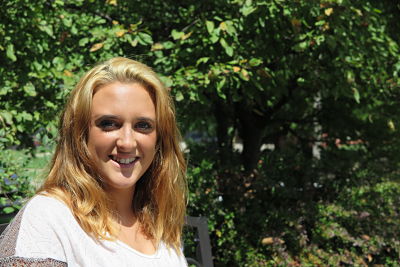October 10 marks World Mental Health Day. 2019’s theme is suicide prevention. According to the World Health Organization, every 40 seconds, someone loses their life to suicide.
Two hours. That’s how close the doctors said Andrea Huston was to death by suicide.
Last December was bleak for the Kahoka, Missouri, resident. She was transitioning into adulthood and had recently moved back home after a sexual assault.
“I moved back down here after that situation happened,” Andrea said. “I started getting into situations that I shouldn’t have. I started [rebelling] a lot more. I moved back with family so I could…get my head on straight, so I could figure out my next move.”
For Andrea, that next move didn’t come through clearly.
“I got in a super-bad argument with somebody,” she said. “I don’t really remember that night, but I know I was upset, and hopeless. I drove down to the river and took some medicine…and…some alcohol.”
The events of that night weren’t Andrea’s first suicide attempt.
“That night at the river was my second attempt, because the week beforehand, I found a bunch of random pills in my medicine bag,” she said. “Nothing worked, it just came back out, so I thought it was over. And then, the week after that, I was feeling really down. I grabbed stronger medication, drove down to the river, and then all I can remember from that night is just sitting in my car, listening to music.”
While the music played, it formed a soundtrack to Andrea’s past. Like a movie in rewind, memories of her past trauma, sexual assault and failed relations came rushing back, memories that she thought she had locked away.
When thinking about that night in early December, Andrea compares it to a flood.
“I was really in a down place, just trying to figure out how to be an adult and how to survive on my own,” Andrea said. “After you’re stuck in that zone, everything just starts flooding at once. I don’t really know why it all came at once, but it was like a dam. It broke.”
Andrea, feeling hopeless, started looking for anything that would show her which way to go.
“I’m not really a big religious person. Like, I know there are higher powers and everything like that, but I just found myself talking to what I would call God,” Andrea said. “I was just looking for a sign, just to help me get out of this funk, to get to a better situation. I never really noticed a sign, I guess you could say.”
And without sensing an answer, Andrea downed some pills with alcohol, went to a party, and drank. A lot. She drove home, but blacked out. She has no memory of anything after reaching the halfway point to her parents’ house.
“Somehow, I made it home, fell asleep in the chair, and my mom dumped water on me to help me try to wake up,” Andrea said. “I wouldn’t wake up, though. The next thing I know, I woke up in the emergency room at the hospital.”
Hours later, Andrea met Denise Stutes, a therapist from Optimae’s Behavioral Health Services who serves on a crisis assessment team for two local hospitals in southeastern Iowa.
“It was very intense that night,” Denise said. “I knew that I had to either grab her or lose her at that moment. It was quick. I had to do something, because she was fading in and out.”
Denise decided to take an unconventional approach, and using language she said she wouldn’t normally use, she asked Andrea bluntly, “If a tree falls in your path, are you going to sit there and cry about it or are you going to climb over it?”
Andrea recalls that as she was getting more coherent, Denise told her that she didn’t have to go through her situation alone. Denise was there for her and going to be with her to get through it TOGETHER.
“They’re literally words that I will never forget. ’Cause when you’re stuck in a hospital bed, contemplating life or death and someone brings that up, it’s going to stick with you,” Andrea said. “She gained every bit of my trust.”
In remembering that night next to Andrea’s hospital bed, Denise said her language wasn’t the only thing that was unconventional. She said she was willing to grant Andrea a discharge from critical care.
“What Andrea did was a typical one-way ticket to a psychiatric unit. I’ve NEVER recommended discharge to someone who did what she did, never,” Denise said. “But I talked to her parents and her nurses. I spent a lot of time with her that night, right next to her bed.”
Andrea said those hours next to her bed brought her around.
“She sat there; she listened,” Andrea said. “It was the way she held herself together and how she approached me. That’s what I fell for. I thought, ‘She’s really here; she’s with me.’”
For Denise, it was Andrea’s spirit.
“She wanted to work to get better; I could feel it,” Denise said. “I told her later, there was a lot of risk in letting her go home. I can’t explain it, but I trusted that she was going to show up. I talked with her parents, and I trusted she was going to be there.”
After Denise’s conditions were met, and after a lot of dialogue with the nurses, doctors, and Andrea’s parents, Andrea got the OK to head home. The next day, Andrea was discharged from the hospital and went directly to Optimae to meet Denise (who worked through her lunch hour to see her).
“[In Denise’s office,] I still had a lot of trust for her,” Andrea said. “I was very out of it in the hospital. There are very few things I remember. But when I met her again at the Optimae office, I just felt that bond again click.”
Eight months later, Andrea has found more than hope — she’s found a renewed purpose.

Andrea Huston, a suicide survivor, has found a new purpose and is now studying to become a therapist.
“It’s getting my confidence back. It’s definitely my confidence. It’s just mentally being able to handle everything I’ve been through,” Andrea said. “[Denise] has helped me with everything. I’ve found that strong will that I had when I was younger.”
Now, Andrea aspires to be a therapist herself. She’s started online courses at Southeastern Community College, majoring in psychology.
“I want to do what she’s doing,” Andrea said. “I want to be able to give back to people as well.”
Andrea plans to start a foundation near her hometown for sexual assault and suicide victims, and their families, after her studies are complete.
“I’ve always known that I wanted to help people in some way, but I never knew how,” Andrea said. “After going through what I went through, this is the way that I know for a fact that I can help relate to people, that I know what they’re going through, and that I can give them something, like a cheerleader, that I can say, ‘Hey, I’ve been through it; I’m making it through it, and you can do it, too.’”
As she finds her future, Andrea believes there’s no better place to end her journey than where it started.
“I just feel like in this area already, I was in a downward spiral, so I want to make sure my impact starts here,” Andrea said. “I know there are people in smaller towns that don’t have resources, or are not financially able, to afford to travel to them. I see…people that have been through…situations like me…So that’s my major starting point, right there. Because I know it’s something that I went through, that it’s something that I know I can help with for sure.”
If you or someone you know is contemplating suicide, help is available. The National Suicide Prevention Lifeline (1-800-273-8255) is a confidential resource for people wanting to talk.



